News & Stories
Having an impact on tax policy and practice
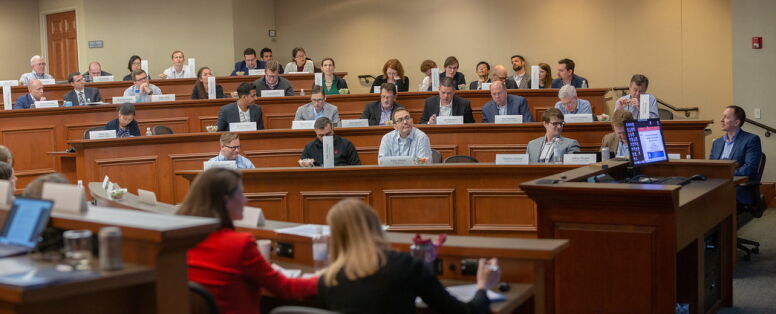
In 2021, Senator Elizabeth Warren spotlighted Amazon, Netflix and similar corporations, alleging they exploit the tax system by paying minimal or no federal income taxes. To address this, Warren introduced her concept of a “Real Corporate Profits Tax” – a 7% levy on book income, the figure reported to shareholders.
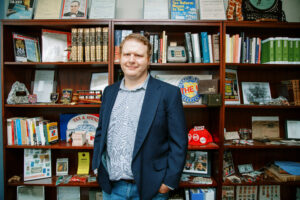 However, experts, including Professor Jeff Hoopes, research director of the UNC Tax Center — cautioned against taxing book income, stating it could complicate the tax code and disrupt stock market efficiency. Speaking at a U.S. Congressional hearing, Hoopes described it as a “band-aid solution that creates more problems than it solves.”
However, experts, including Professor Jeff Hoopes, research director of the UNC Tax Center — cautioned against taxing book income, stating it could complicate the tax code and disrupt stock market efficiency. Speaking at a U.S. Congressional hearing, Hoopes described it as a “band-aid solution that creates more problems than it solves.”
That is just one example of the significant contributions to tax policy and practice by the UNC Tax Center at UNC Kenan-Flagler Business School.
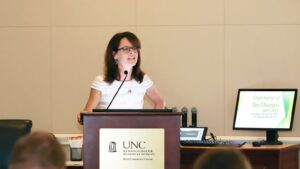 The Tax Center has fostered collaboration between academics, policymakers and practitioners since 2001, says Courtney Knoll, executive director of the UNC Tax Center.
The Tax Center has fostered collaboration between academics, policymakers and practitioners since 2001, says Courtney Knoll, executive director of the UNC Tax Center.
It was founded by Doug Shackleford (BSBA ’80), tax scholar and former dean. “Doug had this vision of a place to tear down silos between industry players — all of whom care about taxes but don’t speak enough to each other,” she says.
Even within business schools, silos exist between finance, accounting and economics departments but they all have a hand in shaping taxes.
“They share an interest in evidence-based tax research and policy, yet they are rarely in the same room together,” says Knoll. “Our mission is to provide a forum to get these folks together and strengthen the impact and relevance of research — to promote sound tax policy.”
The center’s original endowment from Allen Wilson (BSBA ’77), an industry leader, and its Leadership Council further solidify the center’s foundation.
The Leadership Council of accomplished professionals and alumni advises the center’s administrators, guiding decisions and initiatives. It provides a closer connection to practice, meaning the center can stay on top of the latest industry trends and developments.
“Having a connection to an enormous pool of alumni working in senior positions in the industry, creates this feedback loop which enriches our activities,” says Knoll.
The Leadership Council also is instrumental in planning the UNC Tax Summit, a continuing education event co-hosted by the UNC Tax Center and the UNC School of Law. The event provides a learning and networking opportunity for lawyers and accountants, while also offering continued professional and legal education (CPE/CLE) needed to maintain licensure. The 2023 event will include a keynote address by IRS Commissioner Danny Werfel, a UNC School of Law alumnus.
The Tax Center also nurtures talent through initiatives like the Tax Doctoral Consortium, a workshop that introduces PhD students to contemporary tax research. This effort aligns with the center’s mission, says Professor Edward Maydew, senior executive director of the UNC Tax Center. “We want to help educate the next generation of tax scholars and researchers.”
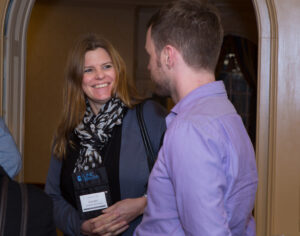 The Tax Doctoral Consortium attracts top talent to UNC, with Hoopes and Professor Stephen Glaeser having their first exposure to UNC when they attended as PhD students from other schools. It comes full circle with Hoopes and Glaeser joining with Professors John Gallemore (BSBA ’05, MBA ’09, PhD ’14) and Eva Labro to devote their time and talents to cutting-edge research and educating doctoral students.
The Tax Doctoral Consortium attracts top talent to UNC, with Hoopes and Professor Stephen Glaeser having their first exposure to UNC when they attended as PhD students from other schools. It comes full circle with Hoopes and Glaeser joining with Professors John Gallemore (BSBA ’05, MBA ’09, PhD ’14) and Eva Labro to devote their time and talents to cutting-edge research and educating doctoral students.
UNC Kenan-Flagler professors bring that research into the classroom, enriching their teaching and students’ learning, says Maydew. “It’s a synergistic relationship.”
The center’s flagship event is the UNC Tax Symposium, which has been convening tax academics and professionals to foster discourse on tax research for more than 25 years.
“Doug developed a winning formula that we still use today: Select papers from a variety of disciplines and take chances on early papers that are likely to generate discussion,” says Maydew. “The set of authors and other speakers over the years reads like a who’s who of tax scholars.”
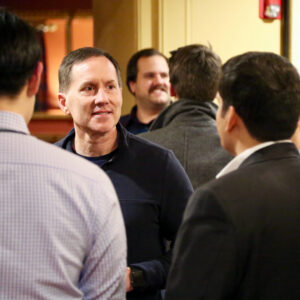 Most years the number of people invited is constrained by room size, says Maydew. “So while we have many regulars, we prioritize bringing in new researchers. Over the years, we count more than 700 scholars who have participated in at least one UNC Tax Symposium. Organizing it is a group effort, with a program committee drawn from our faculty and leading researchers at other schools who are Academic Fellows of the center.”
Most years the number of people invited is constrained by room size, says Maydew. “So while we have many regulars, we prioritize bringing in new researchers. Over the years, we count more than 700 scholars who have participated in at least one UNC Tax Symposium. Organizing it is a group effort, with a program committee drawn from our faculty and leading researchers at other schools who are Academic Fellows of the center.”
The event delivers on the center’s mission, says Knoll. “We explore emerging issues, research and new policies. The events are our loudspeaker, an opportunity to bring together people to talk about shared interests and get academic research outside of silos.”
In an era of partisan policy debates, the center’s independent stance is crucial. “We have no dog in the fight,” says Knoll. “We produce empirical research, gather data and test hypotheses to make informed judgements, so we have a unique and powerful lens to examine tax policy.”
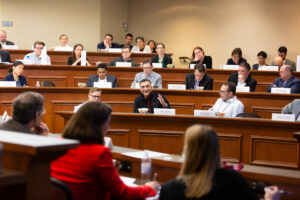 The work of the center’s faculty influences policy discussions indirectly, providing empirical evidence around tax matters in the media. Research by Maydew and colleague Wayne Landsman in the Journal of Accounting and Economics found that when tax enforcement become stricter for people who invest in cryptocurrency, those investors start using conventional strategies to legally minimize the amount of taxes they pay, instead of breaking the rules.
The work of the center’s faculty influences policy discussions indirectly, providing empirical evidence around tax matters in the media. Research by Maydew and colleague Wayne Landsman in the Journal of Accounting and Economics found that when tax enforcement become stricter for people who invest in cryptocurrency, those investors start using conventional strategies to legally minimize the amount of taxes they pay, instead of breaking the rules.
In another study co-authored by Maydew in The Accounting Review, the researchers created a new way to measure how companies avoid paying a lot of taxes over a long time — coined the “long-run cash effective tax rate.” The paper helped launch a line of research about corporate tax planning and has been cited by more than 2,800 subsequent research studies.
Moving forward, the UNC Tax Center aims to enhance research capacity, forge new partnerships and extend its network of academics, policymakers and practitioners.
“We are in growth mode,” says Knoll.